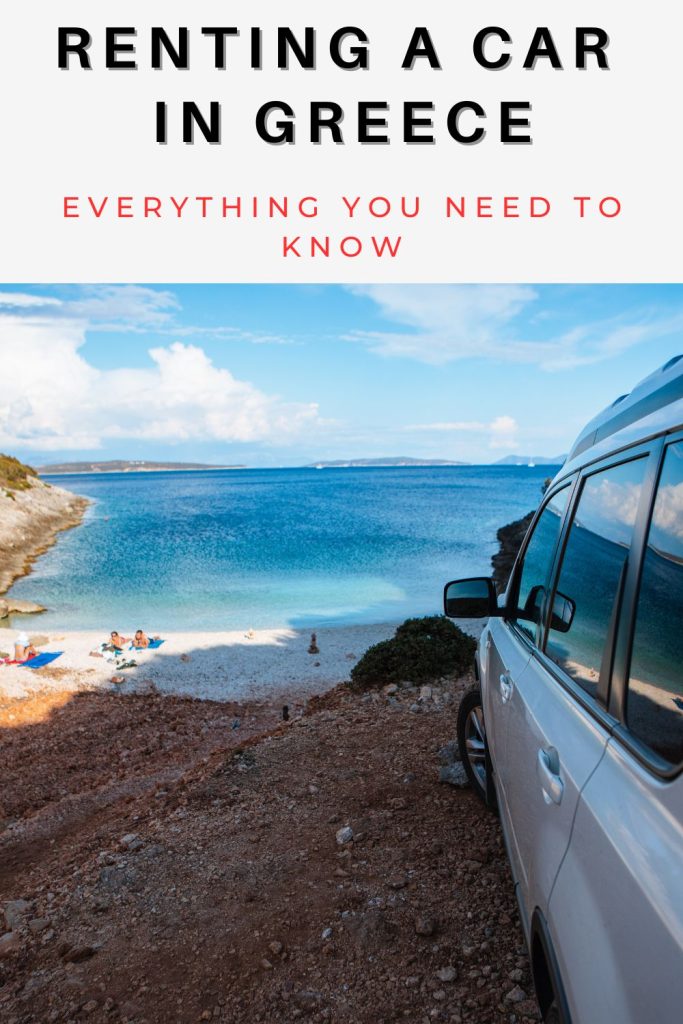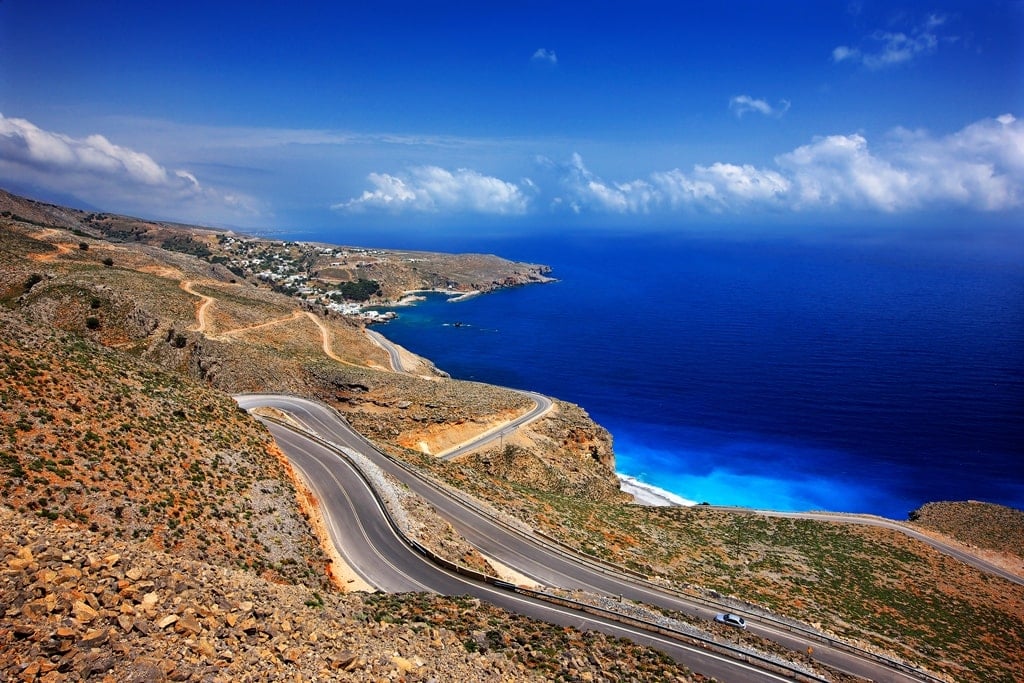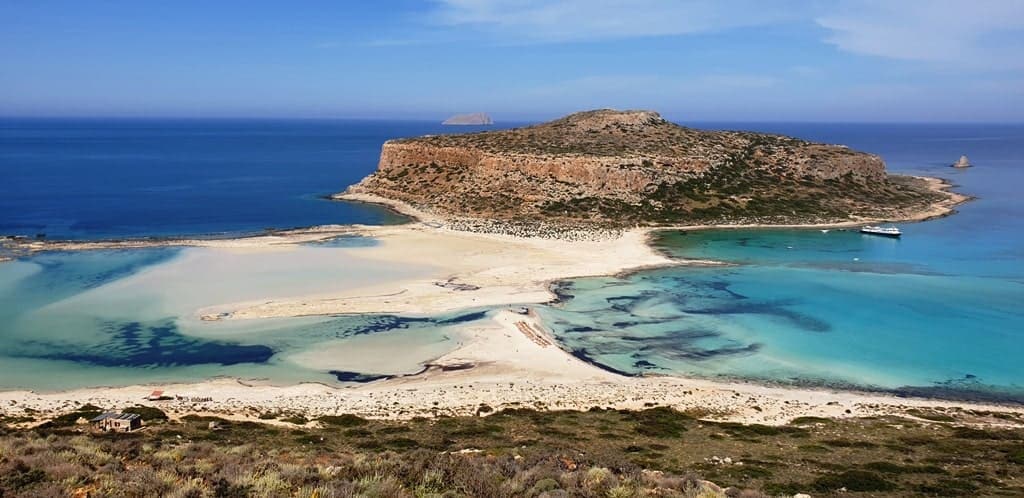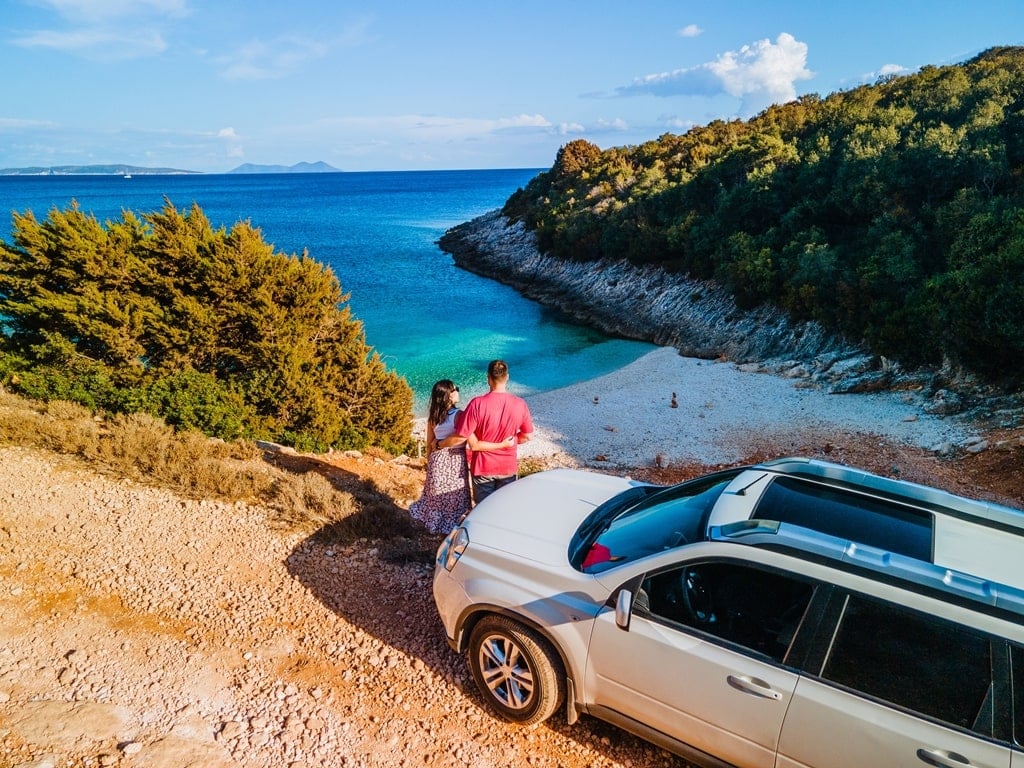Unless you plan to lounge at a beach resort or explore a small specific town in Greece, then renting a car is highly recommended.
Renting a car in Greece is the best way to explore Greece, which is why I always mention in my relevant blog posts whether the option is available in a specific location. However, it may not be immediately clear why renting a car once you get to Greece is a good choice or when it is a good choice, so I’m going to do that today!

Disclaimer: This post contains affiliate links. This means that should you click on certain links, and then subsequently purchase a product, I will receive a small commission.
Why renting a car in Greece is the best way to get around
One of Greece’s biggest treasures is her natural beauty and picturesque villages, the various ancient ruins scattered everywhere, and the capacity to discover little private beaches, restaurants, and even whole towns and villages you otherwise wouldn’t.
Even the best tour will need to leave out things! Tours are also designed to please a vast range of interests and tastes, so they are bound to include main things that companies know everyone wants to see and likes.
Finally, there are areas and locations in Greece that are hard to reach through mass transportation For example, certain parts of the Peloponnese, like Mani, absolutely need a car to explore. Even in the capital, Athens, there are beautiful neighborhoods, great museums, excellent bars, and clubs to visit that aren’t as accessible by public transportation only. And while you have the option of getting a taxi everywhere, that might prove a bit too expensive as the fares add up!
Renting a car takes care of all these problems and gives you full freedom to design your own road trips and take pleasure driving on Greece’s highways or snaky, long, meandering streets.
Tips for renting a car in Greece
The driving experience in Greece
Greeks drive on the right-hand side of the road and overtake on the left. Traffic and driving rules are the standard, and you can expect the international notation of road signs.
You may have heard that Greeks are notorious for dangerous driving. There is truth in this, but don’t picture Greek roads as places where there’s no discipline or lawfulness. What should you picture, then?
Here is the truth from someone who lives in Greece and drives in Greece:
- Greeks do tend to drive over the speed limit. They may attempt to overtake you if you keep the speed limit and the general tendency of the road you’re on is to be 10 or 20 km/hour higher than that.
- They may try to overtake you where it is illegal or dangerous to do.
- Drunk driving is illegal and as such, it isn’t very prevalent. However, you are highly likely to encounter drunk drivers after hours on highways that serve a lot of beach bars and clubs. For example, Athens’ Poseidonos Avenue after midnight is dangerous. Don’t drive in the left lane if you find yourself on such streets at that time.
- Stepping on the road off the sidewalk will not result in traffic-stopping for you if you are a pedestrian. You will be honked at.
- Cars running a red light and going the opposite way in a one-way street are the two things you should always check for. That said, the majority of Greek drivers follow signs and stoplights faithfully.
- Greek streets are narrow by nature. Consider that they are the streets and avenues of very old towns and cities that were created for humans and not for cars. They become narrower due to parked cars on one or both sides so make sure your car is small to make it easier on you.
- Roads are also notorious for their poor maintenance, so be prepared to encounter potholes or bumps from repairs on the road, especially on country roads. Main avenues tend to be free of that.
- Fellow drivers at stoplights and pedestrians are happy to pause and give you directions or tell you where to go to get them.
Note that it is unlikely that you will have bad encounters on the Greek streets if you are careful, obey the traffic rules, and check both ways, anyway.

Tolls in Greece
There are a lot of toll booths on Greek streets, especially near cities or at intervals on big highways. The price ranges from 1 to 3 euros on average per toll booth. This can add up if you plan to drive across big city centers. For example, the route from Athens to Thessaloniki will cost you around 31 euros in toll booth charges alone. This can fluctuate depending on your itinerary choice, but it gives you an idea.
There are two ways to pay at toll booths: by cash or by “e-pass”. Unfortunately, currently, the e-pass function is only available for locals as it is a subscription service requiring a bank account in one of the major local banks.
Therefore, when going through a toll booth spot, make sure that you have cash on your person and make sure you don’t drive up to an “e-pass” booth as there is nobody there to process anything. If you make the mistake to drive up to an e-pass booth, you will need to back up and drive to a booth for cash, which is very dangerous.
Please note there are no tolls on the Greek Islands.
Paperwork and requirements for renting a car in Greece
To be able to rent a car in Greece, you need to fulfill the following requirements:
- Be at least 21 years old and under 70 years old
- If you are under 25, you might be charged a surcharge
- Have had your driver’s license for at least a year
- You must have an international driver’s license (also known as an International Driver’s Permit)
- If you are an EU resident, you must have an EU license
- You are required to purchase insurance
- If you have a child under 4 years of age, you must have a car seat
- You need a credit card to rent a car
- You must read the requirements of the car rental company of your choice for any extra requirements

Where to rent your car
The right answer to this question is from the comfort of your home!
The best way to rent a car in Greece is to do it in advance while you are planning your vacation. This will not only get you a far better deal than if you seek to find a car when you’re in Greece, but also a bigger selection of cars.
This is important because the majority of cars in Greece are manual. Greeks are customarily taught to drive a stick shift. Therefore, if you don’t know how to drive that category of cars, you want the biggest available selection possible.
If you know how to drive a stick shift and find yourself in Greece already when you decide to rent a car, your best bet is to find a car rental that isn’t at the airport. There are many that offer cheap budget deals. Just keep in mind that the ‘best deals’ during the high season might be expensive any other time!
I recommend booking a car through Discover Cars where you can compare all rental car agencies’ prices, and you can cancel or modify your booking for free. They also guarantee the best price. Click here for more information and to check the latest prices.
Choose the right car
Choosing the right car isn’t only a question of whether to get an automatic or a manual. It is also the size and capacities of the car, which should serve the use you intend.
If you want to go road tripping in Greece, you want to rent a sedan or cruiser which will make long hours of driving pleasant for you and the family. However, if you plan to go ‘off road’ or explore remote areas of Greece, you might want to rent an SUV or 4-wheel drive which will be hardy for dirt roads, uneven roads, or rough terrain.
Lastly, if you want to use your car mainly in a city (like exploring all of Athens), you want a small car that will be easy to park in streets that are already lined with parked cars.

When renting your car
Give your car a thorough check in front of the assistant or clerk. Take note of all details and their condition, to make sure that you won’t be charged for any damage you didn’t do. Take photos of any notable bumps or scratch marks or anything out of the ordinary. Most rental companies aren’t looking to scam you, but misunderstandings can happen. It’s best to be safe than sorry!
Always read through your rental contract, especially the fine print. It’s boring to do but you must know what you are expected to do and what the rental company’s obligations are as well. You also want to make sure you don’t sign up for any obligation you aren’t okay with.
Get comprehensive car insurance. It is just a few euros more but it will offer you peace of mind and save you a whole lot of trouble if something does come up, such as theft, malicious damage or glass shattering, fire, accidents, or collisions. Your travel insurance is unlikely to cover such costs.
When it’s time to return your car, return it slightly ahead of time. This is to ensure that you aren’t delayed during the returning process and any issues are resolved without wasting your time- especially if you are on a schedule!
Ready to rent a car for your Greece trip? Check out the prices of car rental here.
Taking your rental on a trip
Most rental companies don’t permit you to take the car across the country borders or even on a ferry. If you plan to do that, make sure that you choose a company and a contract that allows you to do that (especially if you are looking to go island hopping in Greece).
However, even if you do find a rental company that allows you to do so at a good price, think about it again. Taking your car with you on a ferry can be expensive and increase the risk of accidents in complicated environments (like the car area of ferries). It might be best to simply plan to rent a new car on every island you go to.
Using the GPS or Google Maps
Greek roads are pretty complex and it’s easy to get lost in a single suburb when you are in cities. Sometimes you won’t find signs giving you directions on where to go, simply because it is assumed you know the geography well enough to infer that directions given for a different location are the same for where you want to go.
Therefore, make sure you have access to a GPS service or use Google maps. However, consider that using your phone in Greece might become unexpectedly expensive if you don’t have a local sim card or a special deal for roaming. Getting a local sim card with a good deal for data is quite easy. Just make sure you got your passport ready for identification papers.

Gas stations and etiquette
There are several gas stations everywhere in Greece, so it’s unlikely that you will ever be unable to find one. Except for the few gas stations that have night shifts (which is very rare), most gas stations operate from 7 am to 7 pm, every day except Sunday.
That’s why you should fill up the tank on Saturday because it’s unlikely to find an open gas station on Sunday. Note that during the high season these rules may bend, but it’s not something you should rely on.
When you drive into a gas station, a clerk will come to your door and ask you how much you want to get in your tank. Due to the high gas prices, Greeks often don’t order more than 20 euros per refueling. Once you give in your order, the clerk is the one who will work the gas pump, so pop the gas tank cover for them. You will pay the clerk (by cash or credit card) and they will bring you your receipt.
There are virtually no self-help gas stations in Greece. Most also have a small amenities and snacks shop and can wash your car, refill things, etc.
Renting a car in Greece is an easy process if you come prepared or, even better, if you do it from the comfort of your home! Driving in Greece can be a wonderful experience if you follow the rules and are aware of the dangers mentioned here: you will be treated to great views, discover wonderful places, villages, and beaches, and make your own schedule.
Be free as a bird and enjoy Greece!


